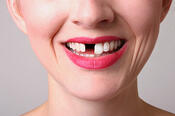 Will missing teeth cause problems?
Will missing teeth cause problems?
1. Missing teeth will affect the way you look and can make you self-conscious about smiling.
2. Your remaining teeth may tilt and drift into the gaps, changing the way your teeth bite together causing problems with your jaw joint.
3. A missing tooth can mean greater strain is put on the teeth on either side of the gap.
4. Trapped food can increase your risk of tooth decay and gum disease. If you have a lot of teeth missing, your facial muscles can become saggy, affecting your speech.
For all these reasons you should visit your dentist to discuss replacing your lost tooth or teeth as soon as possible.
What options do I have to replace missing teeth?
You have three options to replace
1. Denture (false teeth)
Dentures are removable and designed to look and function like your teeth.
A full denture replaces all your natural teeth.
A partial denture fills the spaces created by missing teeth and is attached to your natural teeth with metal clasps.
Modern-day dentures can look very realistic and improve the appearance of your face.
Your denture can become loose as your gums shrink and your bite changes. If this happens, your denture may need to be relined or re-made. It is important to replace worn or badly fitting dentures before they cause problems.
2. Bridges (false teeth that are fixed onto adjacent natural teeth)
• The most commonly used method is a traditional fixed bridge: a false tooth usually made of porcelain or ceramic is fused to two dental crowns that are fitted to the teeth on either side of the gap.
• Bridges are not removable.
• Dental bridges can last for 10-15 years if well looked after.
What Are the Benefits of Dental Bridges?
Bridges can:
• Restore your smile
• Restore the ability to properly chew and speak
• Maintain the shape of your face
• Distribute the forces in your bite properly by replacing missing teeth
• Prevent remaining teeth from drifting out of position
3. Dental implants (metal 'pegs' are placed in your jawbone, and dentures, crowns or bridges are clipped or screwed on top of them.)
The Advantages of dental implants:
1. When a tooth is lost, the missing root also causes problems since the bone surrounding the hole where the root used to be will gradually shrink and disappear. A dental implant placed in this area can actually stimulate bone growth and production, preventing loss of valuable bone structure.
2. By replacing lost teeth with an implant, no support is required of the adjacent teeth, and your natural teeth do not need to be prepared or altered in any way.
3. Dentures can come loose and look unnatural if they do not blend with your gums, and some bridges and dentures have unsightly metal clasps to hold them in place. Dental implants provide a much better cosmetic and functional end result.


.png?width=320&name=Request%20(1).png)

